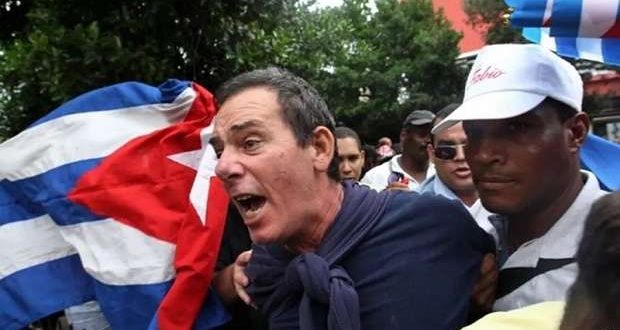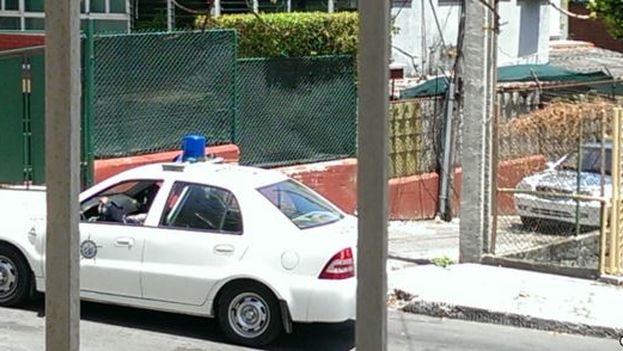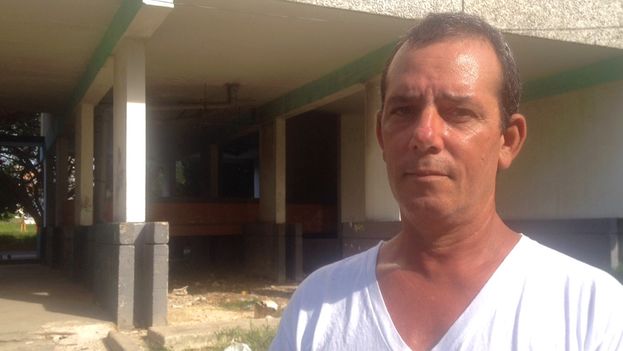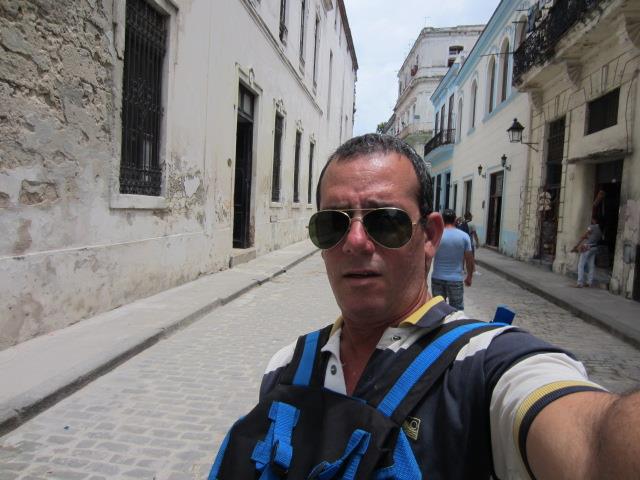
From the Blog: Iván García at Desde de la Habana, 4 July 2022, Havana
Author: Lazaro Yuri Valle Roca, political prisoner of conscience. Combinado del Este, maximum security prison, June 25, 2022, three days after being arbitrarily and unjustly tried by a court.
I write these lines to release those thoughts and events that led me to make the most correct decision I have ever made in my life: to declare myself an opponent and fight against the oldest dictatorship in Latin America.
It was the year 1978 or 79 when my grandfather Blas Roca arrived at the house feeling unwell. As I heard my grandmother, Dulce Antúnez, tell it, he had had a fierce argument with Fidel Castro. Those heated discussions with Fidel were quite frequent. It is already known what the character of the dictator was like, his arrogance and smugness.
My grandmother asked Dr. Cabeza what was wrong with my grandfather and he told her that it was nothing, that it had only been a headache and he had given him a painkiller. But my grandmother, who knew my grandfather well, called me into the room and told me to get ready because we were going to take him to the clinic. Dr. Cabeza questioned my grandmother’s decision, but she told him that she knew her husband well, after having been married for more than 50 years. When we arrived at the clinic, my grandfather’s face and mouth were already disfigured and he was diagnosed with a cerebral venous thrombosis.
From that moment on, things began to get tense, to the point that they got my grandparents divorced so that they could marry him to his secretary Justina Álvarez. They argued that my grandfather and Justina had an extramarital affair of many years, something totally untrue. In that state that my grandfather was in, Raúl Castro got him divorced and then married to Justina. There were countless things they did to my family, to the point of not letting us go to see him. I went on several occasions and Justina would say that she had to give advance notice and schedule an appointment. On other occasions they threw me out because I would talk with my grandfather about subjects they didn’t like, especially the humiliations and contempt towards my family.
I remember the day my grandfather died. My grandmother, with tremendous courage, said to me, “Yuri, your grandfather died. Get dressed, we’re going to the viewing.” And so we walked to the Plaza de la Revolución. She sat next to the coffin and I sat next to her. Imagine the scene when Justina arrived, but my grandmother and I were unshakable. Fidel, Raúl, Ramiro Valdés and Guillermo García were looking on from behind a divider nearby.
At that moment Raúl calls me over to tell me why did I not take my grandmother home, so that she could rest, to which I replied: “Why the fuck don’t you tell her yourselves, or you don’t have the courage to do it, so go fuck yourselves, you sons of bitches.” And I went back and sat next to my grandmother. Five minutes later they ended the viewing. They requested that my grandmother not continue reading
There were many vexations and humiliations against my family. There was a lot of hatred on the part of Fidel and his clique against my grandfather, who was a humble man, simple and correct. We ate, as did the people, according to the ration book. My grandfather never wanted houses on the beach and – after much insistence from Fidel and Raúl – he would rent a beach house for vacation, but the family had would have to save all year to pay for it.
On one occasion, Raúl sent a gift Jeep to my grandfather and he returned it to him. He told him that in the Central Committee you could only have one car. There are countless things I could tell you; that’s why my grandfather was not liked, because they could never corrupt him. He had arguments with Fidel when the 1976 Constitution was drawn up, because Fidel wanted to impose arbitrary things and my grandfather never agreed with it. He was the only one who would dare tell Fidel Castro that something could not be done. That’s why they hated him, that’s why they got him divorced while he was sick, with his brain shattered by clots from thrombosis.
On another occasion, in 1981, I was 20 years old and was spending my military service in border guard troops, in the national squadron located in the Ensenada de Cubanacán, near Jaimanitas, Havana, where I worked as a radarist on a Griffin interceptor ship. Many leaders kept their boat and yachts at that marina, including Fidel. The skipper of his yachts was Colonel Kiki Finalé, who was going around there that day in a speedboat. One of the boys I had under my command ran to find me, to tell me that Finalé was harassing and humiliating them, showing off and imposing on them his arrogance and despotism for being a colonel and the skipper of Fidel Castro’s yachts.
I went to the aid of the soldiers, getting into a tremendous argument with Colonel Finalé, to whom I ended up saying that over my cojones would he leave the marina towards Varadero – where they were headed that day – and then I left on the ship to do my guard duty. When I saw his battle-drill motorboat coming and fired the warning shots at him, he stopped the boat. When I approached, in the boat with Finalé were Alejandro Castro and Juan Juan Almeida, who immediately recognized me. I didn’t know that Kiki was accompanied by them, I apologized and they continued their journey. This incident resulted in the fact that five days later I was expelled from military service, with the prohibition that I could not carry any firearm.
I hope you understand that I cannot be more explicit and provide more facts and details. I am imprisoned and I have many inmates around me, keeping an eye on the smallest detail – what I eat, what I write – everything. In addition, to produce this text and make it reach its destination, I must circumvent searches and inspections. I hope that with these few examples you understand why I decided to stand against the dictatorship.
My grandparents always told me to think and do whatever I wanted. From them I learned to hate the dictatorship, to help the most needy, and that the people – the sovereign – are the ones who rule. I was also taught these words of our Apostle*: “One man is worth no more than an entire people, but there are men who do not tire when their people get tired, and they choose war before entire peoples do, because they do not have to consult anyone but themselves. And peoples have many men, and cannot consult each other as quickly.”
The time I was most proud of my grandparents, Blas Roca and Dulce Antúnez, was on one of my trips to the United States, when I was greeted by friends who knew my family. Their words of admiration and respect for my family were moving. That is why I fight against the dictatorship, that is why every day I feel proud of my grandparents and of my mother, Lydia Roca Antúnez, who instilled in me pure and patriotic feelings.
It is my commitment to continue with the fight they started. To carry out their ideas is my guide and my strength. And the examples of Martí, [Antonio] Maceo, [Ignacio] Agramonte – they give me strength to face all of the abuses and humiliations that inflicted on me in an effort to make me desist in my struggle so that Cuba and Cubans are free once and for all. The Apostle taught us that “heroes are those who fight to make peoples free, or those who suffer in poverty and misfortune to defend a great truth.”
Thank you very much to all the brothers who raise their voices in my defense to get me out of this unjust and arbitrary confinement, which I face with the firmness of my family legacy and my ideals. And with the conviction that Cuba has to be free now.
Homeland, Life and Freedom.
Lázaro Yuri Valle Roca, political prisoner of conscience.
Combinado del Este, maximum security prison, June 25, 2022, three days after being arbitrarily and unjustly tried by a court.
Note from Iván:
This testimony was made known in Havana by Eralidis Frómeta, wife of Lázaro Yuri.
*Translator’s note: José Martí, the 19th century national hero, is often called the “Apostle of Cuba” or the “Apostle of Cuban Independence.”
Translated by: Alicia Barraqué Ellison



